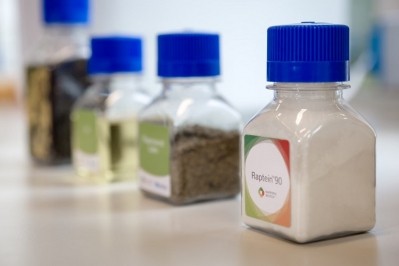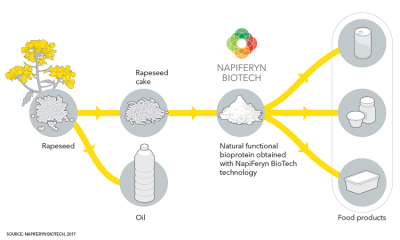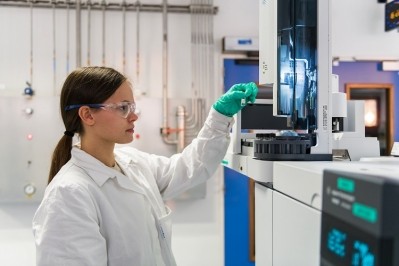Could rapeseed protein be the new soy? Start-up develops tech for ‘Raptein’ extraction

Rapeseed, or canola as it is known in the US and Canada, contains approximately 20% high-quality protein. This is what makes rapeseed cake – a by-product of rapeseed oil production – a nutritious feed for livestock.
However, concerns surrounding food security and the environmental impact of livestock farming is driving a food systems rethink. If the grain used today as fodder was used to feed humans, for example, an additional 3.5 billion people would receive nutritious plant-based food.
This is the rationale behind Polish start-up NapiFeryn BioTech, which has developed technology it hopes will reduce food insecurity and encourage increased uptake of plant-based eating.
“So far, there has been no technology capable of extracting protein [from oilseeds] with sufficient quality and yield to make the process economically viable,” explained co-founder and CTO Piotr Wnukowski at the INNOVEIT awards in Budapest this week, “until now”.
Patented technology removes bitter taste
NapiFeryn’s technology extracts, purifies, and isolates functional proteins derived from oilseeds for use in food formulation.
The technology is protected by a ‘family of patents’, the CTO told FoodNavigator. “We have a patent on the extraction process, but also patents on the purification process further on downstream. In the end, we are able to obtain protein in pure form.”
The start-up’s technology can be applied once oil producers complete a cold, virgin press, which the Wnukowski ensured us was a ‘gentle process’.
The purification process is also integral to NapiFeryn’s technology, given rapeseed’s intense, bitter taste. It is this unpalatable element of rapeseed that has previously deterred industry from employing the rapeseed cake by-product in foods for human consumption.
“This is our second trick, and our second patent,” the CTO revealed. “We are able to purify protein from so-called anti-nutritional factors. There are two families of them: phytic components and phenolic compounds. The phenolic components render this bitter taste. And we are able [with our purification technology] to remove them effectively from the product.”

Better than soy?
The start-up claims the rapeseed protein, which it has named ‘Raptein’, could unhinge soy’s dominance in the plant-based space for a variety of reasons.
Raptein production, for example, does not require the use of the chemical solvent hexane. “Today, industry is using hexane and other harsh chemicals to extract edible oils from seeds. It is used in the soy industry. All [soy] protein isolates have seen hexane in the production process,” said Wnukowski.
“Soy has dominated the plant-based protein market to the extent that 95% of all plant-based proteins – with the exception of wheat – is soy. But rapeseed…is even better.”
The start-up claims that rapeseed contains higher levels of certain amino acids than soy and is devoid of phytoestrogens – or isoflavones as they are known in soy – which have a weak estrogen-like action. These active substances are suspected of disrupting females’ hormone systems.
An EIT RisingFoodStar
NapiFeryn BioTech is a member of the European Institute of Innovation and Technology (EIT)’s RisingFoodStars Association. EIT Food is a pan-European consortium funded by the EU that focuses on entrepreneurship and innovation in the food sector.
“We are elected as a rising star of EIT Food and are very happy to be affiliated with EIT,” co-founder and CTO Piotr Wnukowski told FoodNavigator. “It gives us a very good opportunity to connect with innovative food companies and investors.”
The protein can be used in a wide variety of applications, the CTO told this publication. “It is soluble, it has good emulsifying properties, gelling properties, and foaming properties. It absorbs fat and water, and you can use it in shakes, beverages, ice cream, bakery, pancakes, pasta, salsas, mayonnaise, meat extenders, you name it.”
Monetisation strategy
NapiFeryn is currently in the pre-commercialisation phase, delivering sample quantities to the food industry from a pilot facility. Commercial quantities will be available by 2022.
The start-up will not, however, be selling Raptein itself. Rather, NapiFeryn plans to license its technology to oil producers, who will manufacture the food additive themselves.
From there, the oil producer will sell Raptein to a global distributor – which has been selected by NapiFeryn – who will sell on to food and beverage manufacturers. This means that only oil producers that agree to sell to NapiFeryn’s chosen ‘go-to-market’ partner will be able to license the technology.
The CTO could not yet disclose which distributor NapiFeryn had chosen. “We are still in the process of selecting the best partner to go to market,” he told FoodNavigator, but confirmed that the start-up is seeking a single global player.
“Rapeseed is the major oilseed crop in Europe and Europe is the world’s largest producer of rapeseed. Then comes Canada, China, India, and Australia. So we aim to land our technology via licensing agreements in all these parts of the world.”


























